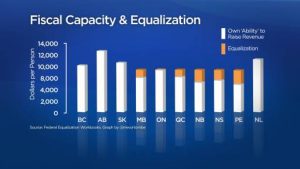December 15, 2018 7 min to read
Is it fair that Québec is getting the lion share of Equalization payments?
Category : Attacks on Québec, Politics
Albertans are currently threatening a boycott of Québec products because Québec almost has full-employment and Alberta is in an economic Crisis and yet, Québec will be getting 13 Billion dollars (1.4 Billion more than last year) and Alberta zero.
Furthermore, Québec has the best social programs in Canada (and thus, in North America), a part of which are paid by the Equalization payments, so it gives the impression that Québec is robbing the other provinces to pay itself a golden set of social programs, doesn’t it?
First, what is the equalization payments?
A portion of every Canadian’s federal income tax return isn’t spent directly by the federal government, but instead, is pooled in a big fund which is then divided province by province to try to help poorer province pay for social services that only the richer provinces could otherwise pay.
Every citizen of every province contributes to the equalization payments… but only the poor provinces get money back.
So, why does Québec get the lion share of the equalization payments?
The payments are based on the capacity for a province to pay for its social programs, and that capacity is based on the revenues a province makes.
Revenues of a province are based on three major sources:
- Salaries of its citizens (via sales tax and income tax)
- Property values (via property taxes)
- Corporate profit (via corporate income taxes)
As it turns out, the key indicator is the salaries, because higher salaries allow for higher housing costs and higher consumptions and thus, higher corporate profits.
Let’s see what Workopolis has to say about the average salaries per province for 2017:
| Alberta | $ 59,384 |
| New Foundland and Labrador | $ 53,820 |
| Saskatchewan | $ 52,728 |
| Ontario | $ 52,260 |
| British Columbia | $ 49,244 |
| Manitoba | $ 47,632 |
| Quebec | $ 47,320 |
| New Brunswick | $ 46,644 |
| Nova Scotia | $ 45,292 |
| Prince Edward Island | $ 42,380 |
That same year, Workopolis reports that the average salary across Canada was $51,000.
In the recent anocement about the equalization payments, the 5 provinces which will receive equalization payments are the five at the bottom of the above table and are the 5 of the 6 provinces with (in 2017) an average salary lower than the Canadian average. I do not currently have details on why British Columbia is below the average and doesn’t get equalization payments. I will update this article if I do, but I suspect other factors are in play to increase revenues for the province.
This means that Albertans, on average, make a good $12,064 Canadian more per year than residents of Québec with which to pay income tax, sales tax and properties (and thus, property taxes), not counting oil revenues which Québec doesn’t have (more on that below).
Québec is getting more money than the other provinces because it has more residents.
Global News’s Trever Tombe made an excellent graph showing that in effect:

We can clearly see that what the Equalization payments do, is to provide each province with what is missing for them to make about $10,000 per year per person. Québec actually gets less money per person than the other provinces that do get money, but since we have a lot more residents it translates to more money total.
But if Québec is able to pay social programs, doesn’t it mean it’s rich?
It sadly doesn’t work that way. A lot of families, for example, were not making enough money to pay for a full-time daycare, preventing the mother from returning to the workplace until their youngest child was in school.
The “Centre de la Petite Enfance” (Our subsidized daycare system) helped hundreds of thousands of new mothers to return earlier to the workplace so that they could keep gaining experience and earn more money in their career.
This is a social program born in the necessity to compensate the fact that many families couldn’t afford daycare and as such, either chose not to have children or decided to put the mother’s career on hold, reducing the family revenues long-term (due to the lower number of raises the mother could get).
The same is true for our provincial medicine insurance: many Québec employees were unable to pay medication at Canadian averages and yet, didn’t make enough money to have collective insurances. The program was put in place to compensate for the fact that Québec is poorer, and try to help it’s residents.
Québec is paying social programs to help it’s resident with the equalization payments: that’s exactly what they were created for!
But then, why is Québec so poor?
The age-old question!
This blog offers a few ideas on what some of the causes might be:
- In this article, I talk about the education deficit for French Canadians
- In this article, I talk about how Montreal was basically murdered by the Federal government (in the “Ugly” part)
- In this earlier article, I talk about how the Federal government repealed a law which hurt Québec for unjust reasons
But there are plenty of other reasons to go around: lack of United States urban centers near the border (Like Detroit and Seattle for example for Ontario and British Columbia), the fact that Québec was colonized by France while the rest of Canada was colonized by Great Britain (therefore causing a language barrier to investment).
The problem is the circle of poverty: as other richer provinces raise their revenues, it becomes harder for poorer provinces to compete with them since they do not get extra revenues.
Ontario, for example, can invest its extra revenue from higher salaries in better hospitals and better schools which will make its long-term citizens more productive and thus its companies more profitable, encouraging them to invest more in the province.
Alberta was able, more than a decade ago to abolish (temporarily) its provincial income tax, while Québec still needs to have the highest provincial income tax in Canada in order to survive.
But can’t Québec just raise the minimum wage?
Sadly, in order to raise the average salary to Alberta’s level, Québec would need to raise its minimum wage from $12 CAD per hour, to $29.70 CAD, or twice the Ontario minimum wage which at $14 CAD per hour, scared companies into proposing benefit cuts.
The problem isn’t the minimum wage, it’s the higher wages: those of professionals, of the tech industries, of high paying industries.
Even if Québec was able to raise magically its average wages, the problem isn’t so much that Québec has lower salaries, it’s that the poor provinces have less average salary growth over a long period than the richer provinces. That’s precisely why they are poor provinces. It’s not the symptom: it’s the cause.
Of course, these are just trends. In 2015 (according to Global News), the Salaries only grew in three provinces: Prince Edward Island, Nova Socia and New Brunswick, the three poorest, and declined in Alberta, the richest (and in Québec, the next poorest). The other 5 provinces saw little changes.
If Québec rejects Albertan oil, it shouldn’t get Albertan money!
This is a popular argument and I can certainly understand the sentiment. The problem is that Québec doesn’t reject Albertan oil (ok, I admit, some environmentalists do reject it), what it rejects is a specific pipeline which passes thru the water source for a majority of Québec residents.
When the pipeline will leak (and judging by the vast number of pipeline leaks over the last decade, that’s a when, not an if), it will contaminate the drinking source for over 4 million Québec residents.
Albertans hear our environmentalists arguing about how dirty the Albertan oil is and how we don’t want it period, but the silent majority of Québec residents are actually mostly scared of an oil spill which might pollute their drinking water.
To make matters worse, all attempts to discuss mitigation, alternatives and other ways to reduce the risks seem to have fallen into dead ears.
Then why doesn’t it develop its own oil?
Because so far, no financially profitable oil extraction project has ever proposed in Québec. Yes, there were exploration wells. Yes, there were pilot projects. But so far, no financially profitable oil extraction project has ever proposed in Québec.
Yes, I said it twice… At the time of writing this article, not a single project proposed by an oil prospecting company was deemed profitable enough to turn a profit. It costs money to operate a well, which is offset by the revenues from that well.
A few projects could have turned a profit… provided that the well construction was subsidized by the provincial government, but that kind of arrangements do not help a province crawl out of poverty.
Why the equalization transfers help Alberta
When a province gets too poor, some of its residents try to flee to other provinces in the hope of better jobs. Already, many Québecois moved to Alberta to take jobs in the oil industry. If Québec was even poorer, who knows if we wouldn’t have another exodus of French Canadians to other provinces to flee misery in Québec.
However, Ontario, Alberta and the other rich provinces are able to maintain their status by having low unemployment and highly specialized employees in their local specialties. A massive migration of Québec residents trained in Québec specialties (like the video game industry, dairy farming, the textile industry, etc…) wouldn’t be a boon to those provinces.
Québec after all, is getting richer… just never as fast as Alberta or Ontario!


Comments (2)
-

-

steve b October 23, 2019
So your suggesting that the pipeline will leak so no go right, then Lac Meganitc happened but you still believe that you can find payphones all over the place, that you can fix your brand new GM car or truck yourself like yo pappy did on the ole' '75 GM car, that houses should be built of sticks and mud, home phones are still a "thing" and on. YOur lack of pipeline inspections, radiology used in detecting leaks and ALL of those leaks you speak of have been ini 24 year old + pipelines. How again does your 24 year old car run - you are short sighted yet again.
mpf December 13, 2019
Hi Steve, Lac Megantic did occur and it was horrible... please note that the Québec government did ask if there would be more inspections and safety rules than in the past (because right now, the rules are rather lax) but didn't get any clear answers. That's part of the problem: the pipeline was presented only on the economic factor while the Québec citizens saw it in the environmental factor. No one bothered to, for example, make a graph showing how much oil was wasted by transiting by train, or the measures that would be taken to protect the St-Lawrence river. One side was talking economics and the other environment. In that discussion, both were talking and neither was listening.